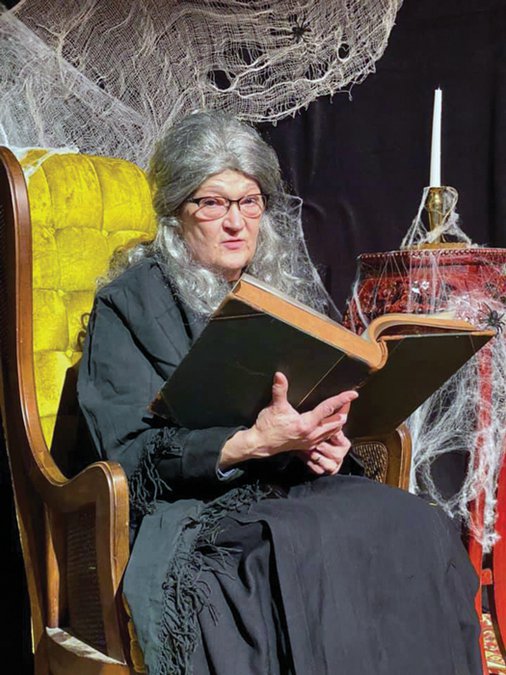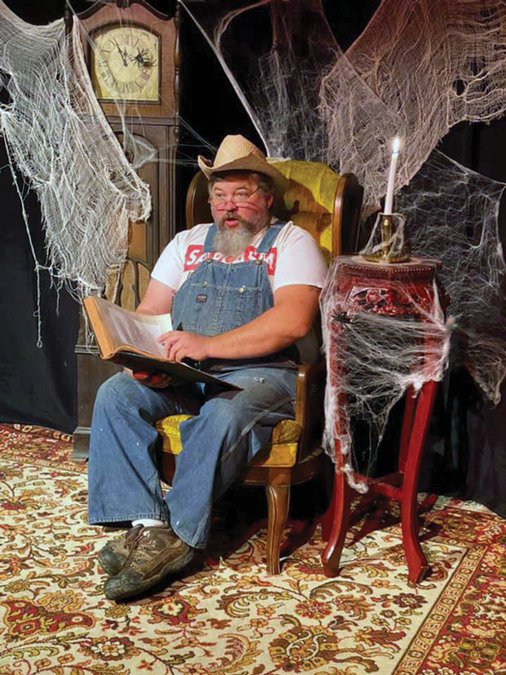MONROE — With their dim lighting and walls built to carry sound, theaters are no stranger to paranormal encounters.
Whether it be unsettling sightings of past tenants or mysteriously disappeared and moving objects, myths and legends within the theater community have led to the common superstition that every theater has a ghost.
Sometimes the ghosts can be blamed for stage mishaps or lights that turn on and off by themselves. In other theaters, it is believed that the ghosts enjoy putting on their own performances or even sitting down to watch a live performance. Regardless of what it is their ghosts do, what many haunted theaters agree on is that the ghosts, too, need a little light in the dark. The solution: a ghost light.
The origin of the ghost light is unclear, as is its true purpose, but what many who have worked in theater will say is that the single bulb and stand lightening center stage is there for the ghosts — in what capacity is disputed.
“Some people say it’s just about being safe in the theater when the theater is dark,” Denise Plantenberg, MTG facilities manager, said. “But a lot of people like to think it has more to do with ghosts in the theaters being able to have the stage when nobody else is in the building and do their own performances and do their own dances and their own singing.”
The seats have been empty and halls quiet at Monroe Theatre Guild since COVID-19 forced the doors shut in March, but even the absence of daily patrons hasn’t left the stage completely dark thanks to their own ghost light. MTG member Genevieve Kundert has not had any of her own paranormal experiences at the theater, but she said that others have reported moving objects that have been blamed on MTG’s own ghost.


While MTG has only been housed in its current location since 2010 and local lore has panned out to be nothing more than hearsay, there are many well-documented cases of spooky stagehands and paranormal playwrights throughout the country.
Freeport’s Winneshiek Playhouse, the oldest continuous running amateur theater in the country, has had reports from numerous actors and stagehands of moving objects, unplaceable noises and even apparition sightings, according to a 2017 Freeport News Network article.
A few hours south in Decatur, Illinois, Lincoln Square Theatre is said to house the ghost of a devoted stagehand, One-Armed-Red, who died in his sleep at the theater in 1927. Similar stories have been documented in every state.
Spooky nights at MTG
After months of paused operations, members at MTG were antsy to turn the ghost light off and get back on stage. Embracing the folklore of theater superstition, they are returning to the theater for a Facebook Live production of Scary Stories to Read in the Dark: Theatre!
“We’ve all just really been missing something happening here,” Plantenberg said.


The actors will perform live readings of four different scary stories at 8 p.m. Oct. 30 and 31 on Facebook Live.
They are hoping that the free show will entertain viewers and offer a nice, happy, albeit spooky, evening in the midst of chaos and uncertainty.
“I guess the idea is that we’re doing it as community service,” Plantenberg said. “It’s a tough time for everybody and community theater is for the community.”
The shows will include four readers telling stories that are each around 15 minutes long. An MC will introduce the show and provide background to certain theater folklore, such as the ghost light.
The idea for the Halloween program was born as MTG worked to find ways to keep the theater running, despite having closed doors.
“We’re just all getting creative and finding new ways to keep the arts alive,” Kundert said.
With uncertainty surrounding COVID-19, the members knew that they faced the risk of readers having to back down or quarantine last minute, but they always knew that no matter what, the show would go on, Plantenberg said. Offering the show on Facebook Live instead of in person was one of the measures the group took to keep themselves and the community safe.
“It’s not the first time that we’ve had to shuffle around at the theater,” Kundert said. “But it’s just so important to keep the arts alive — at MTG and in the community.”





